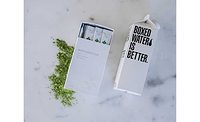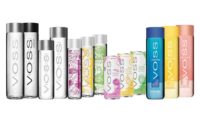Ethos Water:
Drinking For A Cause
By Lori Dahm
One of the distinct aspects
of Ethos Water Co. is that the cause behind the
company actually mirrors the product being sold.
Co-founders Jonathan Greenblatt and Peter Thum formed Ethos Water Co.,
Santa Monica, Calif., in 2003 with the vision of raising awareness and
generating funds to bring safe, sanitized water to children in developing
countries.
“More than one billion people, nearly 20 percent
of the world’s population, lack access to safe drinking water,”
says Greenblatt, who also served as vice president of consumer products at
Starbucks, but announced he was leaving the coffee company this month.
“The crisis spans across all developing countries and is concentrated
in Sub-Saharan Africa and Asia. By purchasing Ethos Water, customers can be
a part of a unique opportunity to make a difference in the lives of
children and communities who need access to clean water.”
The other notable aspect of Ethos Water is that it was
purchased by Starbucks in April of 2005, and this transaction generated a
lot of media attention and buzz because of what it represented for both
entities. For Ethos Water, the purchase opened access to all
Starbucks’ company-owned franchises, the Starbucks distribution
network and the financial support of a mammoth company like Starbucks. For
Starbucks, the opportunity to support a cause such as safe water for
developing countries aligns with the company’s objective to help the
world’s impoverished populations.
“It was exciting for us to expand Ethos through
Starbucks Coffee Co. after our acquisition in April 2005,” says Thum,
also a vice president for Starbucks Coffee Co. “Starbucks is a
company with a long history of integrating a social conscience into all
aspects of its business. Starbucks is not only selling Ethos in its stores,
but the company has increased Ethos’ investment capability
significantly and made an extraordinary commitment to the cause of helping
children around the world get clean water.”
Birth of a noble notion
Clean and safe water is a necessity that most Americans
take for granted. But in many other parts of the world, particularly in
poverty-stricken areas of Asia and Africa, clean water is unavailable and
the death and disease that results from an absence of sanitized water is
overwhelming.
The Ethos Water vision came about while Thum was
working on a consulting project in South Africa in 2000 and 2001. He was
overwhelmed by the severity of the water crisis in South Africa, and came
back to the United States inspired to start Ethos Water. His intent and
vision was that the company’s profits would help support water
projects in developing countries.
“Water is our most basic requirement for life.
Seeing people who lacked clean water changed the way I thought about
things,” Thum says. “I was motivated by both the desire to
create a self-perpetuating platform that could help these people directly
by financing, and helping to organize resources for clean water
access.”
Thum asked Greenblatt to join forces with him; the two
had become friends while completing their Master’s in Business
Administration degrees in Chicago. Greenblatt’s personal interest in
the Ethos Water goal was spurred by his work with the Clinton
Administration, which involved developing economic policy focused on
emerging markets in Asia and Latin America and economies-in-transition.
“I have met with families in remote villages and
urban slums in countries such as Ethiopia and Honduras, and seen firsthand
how their lives have been dramatically transformed by access to clean
water,” Greenblatt says. “I joined forces with Peter in 2002 to
start the business. I was truly excited about the opportunity to use
business as a means to enable social change on a global scale by engaging
consumers and empowering them to make a difference.”
Today, funds from the sale of Ethos Water are
supporting water projects in Bangladesh, the Democratic Republic of Congo,
Ethiopia, Honduras, India and Kenya.
For the cause
For every bottle of Ethos Water purchased, $0.05 goes
toward the cause of safe water for children in developing countries.
Starbucks has a goal of donating $10 million dollars over the next five
years toward non-profit organizations that are helping to alleviate the
world water crisis. In addition, at the time of the Ethos Water Co.
purchase, Starbucks pledged to meet Ethos’ previously stated goal of
donating $250,000 by the end of fiscal year 2005, and Starbucks also vowed
to donate an incremental $1 million by the end of 2006.
“On a per-bottle basis, the $0.05 is about
2.5 times what we had originally projected we would be able to donate as an
independent business,” Thum says.
The purchase by Starbucks generated a lot of buzz from
official media circuits, but also in Internet dialogues and conversations
among consumers interested in green causes and aware of the original Ethos
vision. Concerns were that Starbucks wouldn’t uphold the vision of
Ethos, or that Starbucks was actually making a significant profit from
sales of Ethos Water. However, more money is already being funneled toward
water projects in parts of Asia and Africa since the purchase.
Ethos Water generally costs about $1.80 per bottle in
Starbucks stores, compared to an average of $1.75 for in-store competitor
Crystal Geyser. For consumers looking to make a purchase that has a higher
purpose, the choice to reach for a bottle of Ethos is simple.
“Starbucks always will donate $0.05 per
bottle,” Greenblatt says. “This contribution per bottle
combined with Starbucks’ extraordinary brand awareness, strong loyal
customer base and broad market reach has accelerated our ability to realize
Ethos’ vision on a massive scale. The relationship also has
facilitated our ability to educate consumers about the world water crisis,
leveraging the stores as a platform to raise awareness about the issue.” BI

